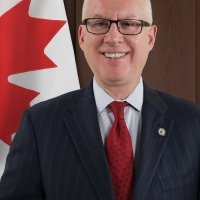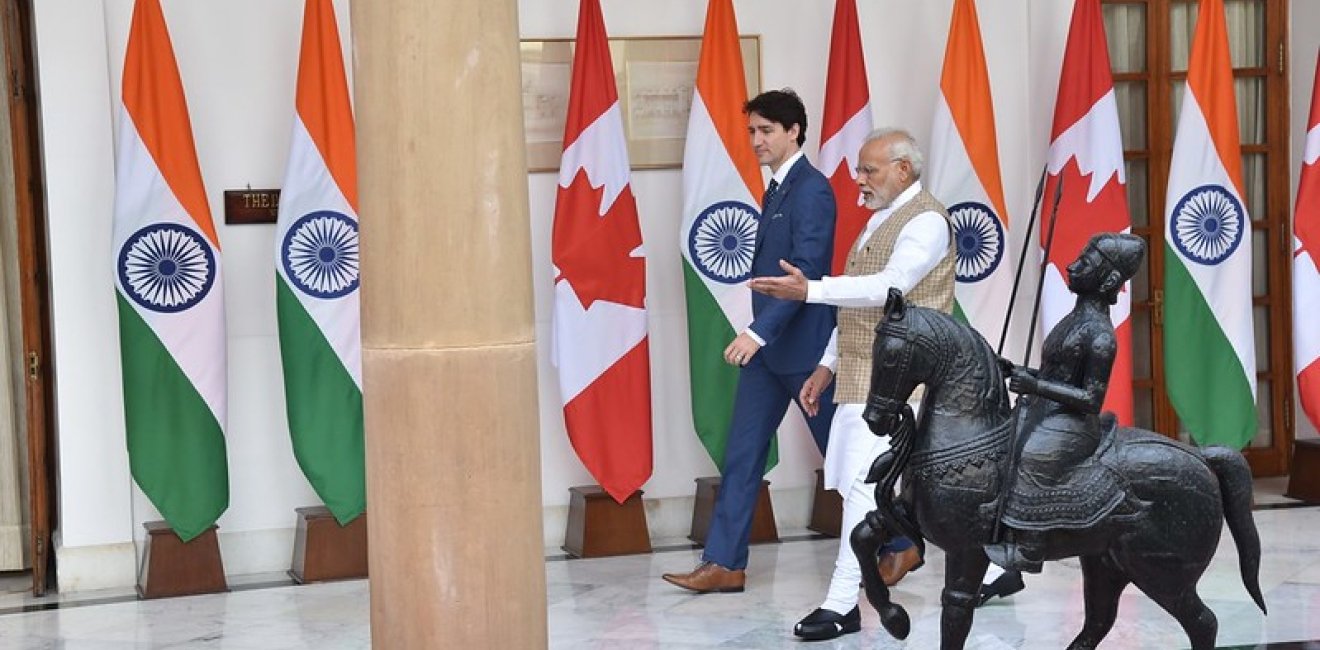On September 18, Prime Minister Justin Trudeau announced that Canadian security agencies had uncovered credible evidence linking the government of India to the killing of Hardeep Singh Nijjar, an Indian-born Canadian citizen, in British Columbia earlier this year. In this collection, Canada Institute experts share their analysis of the ensuing diplomatic fallout and its implications for both countries, the bilateral relationship, and the Indo-Pacific at large.
A Rule of Law Exit Strategy for Canada and India
Christopher Sands
Director, Canada Institute
After the shocking accusation that India was behind the murder of a Sikh Canadian from Prime Minister Trudeau last week, Prime Minister Modi denied involvement and countered that Canada had ignored repeated Indian complaints about the threats from Canada's Sikh community to Indian diplomats and alleged engagement in fundraising and criminal activity by some Canadian Sikhs.
The path to de-escalating this crisis is a mutual recommitment on both sides to the rule of law.
Indian law enforcement should assist and cooperate fully with Canada’s murder investigation. The Indian government’s strong denial of involvement in the murder of Hardeep Singh Nijjar must be investigated, but India should be respected as innocent until proven guilty. And Canada should thoroughly investigate potential illegal activity by individuals in the Canadian Sikh community.
This crisis provides an opportunity for the Trudeau government to demonstrate the value of the National Security and Intelligence Committee of Parliamentarians (NSICOP). Established in 2017 by legislation introduced by Trudeau’s Liberal government, the NSICOP includes members of all parties in the House of Commons and Senate to review Canada’s domestic national security and intelligence organizations and their work. NSICOP members have security clearance to review intelligence and other sensitive evidence.
There is precedent for this use of NSICOP: in 2018, Trudeau asked NSICOP to review allegations of foreign interference by India in Canadian political affairs, risks to the security of the Canadian delegation on the trip, and inappropriate use of intelligence. The full NCICOP report was provided to Parliament, and a redacted version was published.
The rule of law in international relations has been the basis for the alliances and close cooperation among the United States and its allies.
Canada has been steadfast in its commitment to this principle, even when it responded to the United States’ extradition request for Huawei Chief Financial Officer Meng Wanzhou and China arbitrarily detained Michael Kovrig and Michael Spavor to punish Canada. That crisis demonstrated the difference between rule of law respecting countries and the behavior of authoritarian countries like China.
Which side will India choose? Prime Minister Narendra Modi must decide. Canada’s position is clear.
Events Lay Bare Hard Geopolitical Realities for Canada
Danielle Goldfarb
Global Fellow, Canada Institute; Distinguished Fellow, Asia Pacific Foundation of Canada
The Canadian Prime Minister’s public revelation that India’s government is linked to the murder of a Canadian Sikh activist on Canadian soil has sparked a crisis. India has rejected the allegations, and issued a series of retaliatory measures, including no longer issuing visas for Canadians. Each side has sent home some diplomats. Trade talks are on pause. More fallout is likely still to come.
This sequence of events lays bare some hard realities for Canada.
These events show that Indian Prime Minister Modi is not afraid to intervene in another country if he feels India’s interests are threatened. These allegations and India’s denial of them show that India is not always going to play by the rules-based global system in which Canada has a profound stake. They also show that Canada’s large diaspora populations leave the country vulnerable to interference from foreign governments.
In addition, the lack of full-blown support from Canada’s traditional allies means that Canada is largely on its own here. Western countries are counting on growing their economic and security relationships with India to provide a counterweight to China and do not want to jeopardize that.
Moreover, from the Canadian perspective, these events come on the heels of China’s imprisonment of Canada’s “Two Michaels” in retaliation for Canada’s arrest of Huawei’s Meng Wanzhou, plus Chinese interference in Canadian elections.
These events make it clear to Canadian leaders that these two major global powers are leaning into their new geopolitical clout and are not necessarily going to abide by global rules. Worse, neither China nor India is overly concerned about the fallout for their relationship with Canada. India could have resolved this behind closed doors, as Canada tried to do with it at the recent G20 meeting in New Delhi, or sought to cooperate with the investigation instead of resorting to retaliatory measures.
What next?
Things are likely to get worse. But as a small, open economy dependent on global trade and with significant people-to-people connections with India, Canada is likely to do what it can to limit the community and economic impact, while pursuing the investigation.
Like others, Canada saw India as a counterweight to China in its 2022 Indo-Pacific Strategy. Now Canada will need to concentrate on other fast-growth economies in and out of the region. That will include doubling down on diversifying its source countries for international students, as India was its main source for international students in 2022. Canada’s relationship with its most important economic and security partner, the United States, becomes even more important.
Taken together with Canada’s support for the war in Ukraine, Canada is now at odds with three global powers: China, India, and Russia. This is not a good place to be and Canada will need to reconfigure its foreign policy approach for this new state of affairs.
Finally, Canadian leaders are not used to dealing with interference in its affairs by foreign governments. But the country’s diverse population from all corners of the world, combined with the new geopolitical order, means that Canada will need to expect and prepare for more such events.
Murder Accusation is a Diplomatic Bombshell
Richard Sanders
Global Fellow, Canada Institute; Former Member of the US Senior Foreign Service
Prime Minister Trudeau’s recent accusation that India had reached out to kill a Canadian citizen on Canadian soil was a startling development which has produced global shockwaves. This saga may still be unfolding, but there are some conclusions which can be drawn even now.
Canada No Doormat
Canada has already had to face one foreign power—China—which does not consider Canadian sovereignty to be inviolable. After Canada arrested a well-connected Chinese executive in response to a US extradition request, China detained two Canadians on trumped up charges, holding them for almost three years until a solution was worked out.
This, together with the more recent political beating which Trudeau has taken from accusations of a lackadaisical response to Chinese interference in internal Canadian politics, may have led him to take a tough stance against India. Given that as it seems, he received no satisfaction when he raised it privately with his Indian counterpart, he may have felt obligated to go public. And, of course, had the reports of official Indian involvement leaked earlier, he would have been vulnerable to new charges of weakness.
All Politics is Global
This affair also demonstrates the reality that, as a country of immigrants, Canada imports exiles’ politics—and with it the reactions of their home countries. Hardeep Singh Nijjar, originally from India, had been an activist in the cause of Sikh independence and according to Indian authorities once had been involved in terrorism.
Canada has a large Sikh population—almost 800,000 out of 1.4 million immigrants from India, the vast majority of whom have little to do with the cause of Khalistan let alone Sikh terrorism. But the question of Sikh separatist terrorism has a history in Canada. In 1985 an Air India flight from Montreal to Bombay was blown up by Sikh extremists, and only one individual was ever prosecuted. India is currently governed by militant Hindu nationalists who view Sikh activism through a counter-terrorist lens, while Canada sees the issue in terms of the free expression of political views by a valued minority community.
What Now?
Trudeau has made a dramatic accusation, but it is not yet clear whether it, coming out of the secret world of intelligence, can lead to criminal charges being laid. If they cannot, the issue will likely die a natural death, and Canada and India will slowly repair their frayed relations.
However, if information pointing to official Indian involvement is made public, Canada’s allies, notably United States, will be in a difficult position. Statements by US officials indicate an American role in sharing intelligence on this matter with Canada. At the same time, the United States is actively engaged in political, military, and economic outreach to India as part of an emerging strategy aimed at China. The United States has been accused, somewhat unfairly, of providing only tepid public support to Canada on this issue. Threading the needle as it balances US interests will present serious diplomatic challenges for Washington.
Canada Must Stay the Course on the Indo-Pacific Strategy
Deanna Horton
Global Fellow, Canada Institute; Senior Fellow, Munk School of Foreign Affairs and Public Policy
The image of Prime Minister Trudeau’s plane stalled on the tarmac in New Delhi was perhaps a foreshadowing of the freeze in Canada-India relations to come. The allegations of the security crisis surrounding the death of Canadian Sikh activist Hardeep Singh Nijjar are serious, and the actions of Prime Minister Narendra Modi’s government do not inspire confidence that relations will be mended anytime soon. The economic and trade relationship will no doubt take two steps back, and free trade discussions moved to the back burner. However, Canadian governments, businesses, and educational institutions should continue to engage with India as the cornerstone of Canada’s Indo-Pacific strategy.
As an avenue of trade and economic diversification, Canada is right to embrace the Indo-Pacific, with its central pillar India – now even more important in the stance against Russia – the most populous and one of the top three global economies. Canada has a large Indian diaspora and the commonality of the Commonwealth. The United States has joined India, Australia, and Japan in the Quadrilateral Security Dialogue ("the Quad") which is at the apex of strategic developments taking place across the Indo-Pacific region.
India is at center stage and Modi appears to be increasingly confident in the global arena, as evidenced in his recent hosting of the G20. India now seems to leading in a multi-polarity hedging path: navigating between China, Russia and the United States in support of its own interests and as a leader of the so-called Global South.
When Canada adopted its Indo-Pacific Strategy, there was no doubt an objective of growing trade and investment in India. To take advantage of India’s decentralized and multi-layered democracy, Canadian provincial governments and other stakeholders are represented across the Indian federation, and there’s potential for expansion, similar to our sub-national relationships with US state governments, which tend be more resilient in weathering national political storms. There are many interconnected relationships among the many businesses and people that operate in both societies, not to mention the large Indian student population in Canada: there is too much at stake to be subject to the vicissitudes of security politics.
Canada should use any hiatus in the Canada-India economic partnership talks to place more emphasis on the other important regional economies in the Indo-Pacific, namely Japan and Korea plus ASEAN.
On the bilateral relationship with India, in whichever way the current crisis evolves, Canada should not go it alone. Calling upon its important economic and security partners to find the way forward will be a prerequisite. Reaching out to the United States and India’s other Quad partners, Japan and Australia will be key.
India, Canada, and Sikh Canadians in the Dispute
Roy Norton
Global Fellow, Canada Institute; Fellow, Balsillie School of International Affairs
Decade-over-decade, Canadian participation in partisan processes has been declining, with the notable exception of certain diaspora communities. As a result, party dependency on the participation of diaspora community members has concomitantly grown.
Canada’s Sikh community numbers approximately 770,000, or 1.9% of the total population. The first turbaned Sikh was elected to Canada’s Parliament in 1993; in 2023, there are fifteen Sikh MPs constituting 4.3% of the House of Commons. Twelve of the fifteen are Liberals, including two members of Prime Minister Trudeau’s Cabinet; two are Conservatives and both from Alberta, including the Shadow Finance Minister; one, Jagmeet Singh, who represents a British Columbia district, leads the New Democratic Party, the de-facto coalition partner of the minority Liberal government. It is not an exaggeration to say that Sikhs have become part of Canada’s political establishment.
The raw numbers, while impressive in themselves, do not tell the full story. While the Canadian population of Hindu origin is slightly larger at 828,000 and 2.1% of the total population, Sikhs enjoy a well-earned reputation for being much more politically engaged than other diaspora communities in Canada. To be sure, the overwhelming majority of Sikh Canadians elected to federal, provincial, or municipal office live in areas of the country in which there are significant concentrations of Sikhs. But the population, in fact, is quite dispersed – in the sense that Sikh voters are a significant factor as party politics play out across the country.
Fifty, seventy-five, or a hundred Sikh Canadians voting at a party’s constituency nomination meeting where only two-or-three hundred people in total may be voting constitute a significant proportion of the electorate. In ridings with small overall Sikh populations, this participation will not likely result in the selection of a Sikh to be the party’s local candidate. But a disciplined, carefully cultivated cadre of Sikh party members could easily make the difference between the candidate preferred by the party leadership prevailing or someone winning the nomination who, potentially, could be an embarrassment to the party.
Omer Aziz, a former foreign policy advisor in Prime Minister Trudeau's government, wrote on September 22 that fear of losing "the Sikh vote to Jagmeet Singh” led the Trudeau government to "dig in its heels" in response to Indian government demands that Canada ensure its territory "was not used for terrorist financing" by supporters of an independent Sikh state in India.
Diasporas in Canada often prioritize foreign policy objectives ahead of other concerns. Sikhs, and members of some other diaspora communities, are prone to elevated levels of political engagement. In no democratic system are parties inclined to alienate voters on whom they increasingly depend. Which speaks to the reluctance of the Canadian government to accommodate what Aziz regards as a “reasonable demand” of the Government of India: that Canada begin “to take steps to ensure that our land was not used for terrorist financing.”
Today we face a situation in which the Government of India seems quick to characterize Canadian Sikhs as “terrorists.” It displays scant regard for constitutional and legal protections enjoyed by Canadian citizens. Their agents may engage in criminal actions against Canadian citizens on Canadian soil. And they seem dearly to want Canadian political leaders to do and say things certain to alienate themselves and their parties from Sikh Canadian voters.
Meanwhile, if Omer Aziz is correct, the current Canadian political leadership is unwilling to take on board “reasonable” requests of the Government of India. Notwithstanding that a small minority of Canadian Sikhs are supportive of an independent Khalistan, Canadian political leaders, surmising from Aziz, are so fearful of “losing the Sikh vote” that rather than challenge those Sikhs about whom the Indian government may have legitimate concerns, they look the other way. It is possibly the case that through political hyper-activity, Canadian Sikhs have overcome traditional constraints limiting the potential for foreign policy impacts of diaspora communities.
Canada-India Dispute Complicates the United States' Indo-Pacific Strategy
Xavier Delgado
Research Associate, Canada Institute
The United States’ vision for an aligned Indo-Pacific front against China is caught in the midst of a feud between Canada and India over the killing of a Canadian Sikh activist earlier this year.
Policy watchers and experts noted the muted response from Canada’s intelligence partners and Indo-Pacific allies in the aftermath of last week’s allegations and ensuing diplomatic fallout. The United States and United Kingdom both expressed deep concern about the situation but stopped short of supporting Ottawa’s claims, despite the fact that Five Eyes intelligence supported Canadian officials’ conclusions.
Recognition in Washington of India’s importance as a military and economic partner in the Indo-Pacific transcends the bipartisan infighting that can sometimes color US foreign policy. Indian Prime Minister Narendra Modi has been charmed by both former-President Donald Trump, with whom he held joint rallies in Houston and Ahmedabad in 2019 and 2020, and President Joe Biden, who welcomed the Prime Minister to the White House earlier this year. There is a growing roster of shared institutions between India and the United States, including the Quad, the Indo-Pacific Economic Framework (IPEF) and the I2U2 bloc composed of India, Israel, the United States, and the United Arab Emirates. India and the United States have also released strengthened ties between their research and innovation communities, with India recently joining the US-led Artemis Accords and both countries establishing a joint partnership to expand defense industrial cooperation.
Still, the United States’ relationship with Canada is not weaker than its partnership with India. Canada remains a top-three US trading partner, a critical part of North American continental defense, and a direct neighbor with longstanding cultural ties that extend well beyond the two countries’ shared land border. Both Canada and the United States also share a demonstrated commitment to democratic values and a robust history of collaboration in joint institutions like NATO and the United Nations.
In an era where competition with Beijing has become a paramount concern for US foreign policy, Washington cannot afford to blow up its relationship with the strongest regional counterweight to China over Canada’s allegations. At the same time, refusing to act in the face of clear and convincing evidence of India’s involvement in Nijjar’s murder, should it be publicly released, could cripple US credibility as a standard bearer for the international rules-based order and put a strain on Canada-US relations.
In a scenario where neither path – supporting Canada’s intelligence findings or backing India’s claims of innocence – is desirable, US policymakers will have to help craft a solution through dialogue with their counterparts in New Delhi and Ottawa to forge a third way. Leaving this dispute unresolved is not an option: the United States will need both India and Canada in the brewing competition with China.
Authors


Senior Fellow, Centre for International Governance and Innovation; Distinguished Fellow, Asia Pacific Foundation of Canada

Former member of the Senior Foreign Service of the U.S. Department of State

Distinguished Fellow, Munk School of Global Affairs and Public Policy, University of Toronto

Fellow, Balsillie School of International Affairs/Adjunct Assistant Professor, University of Waterloo

Research Director, Washington Forum on the Canadian Economy

Canada Institute
The mission of the Wilson Center's Canada Institute is to raise the level of knowledge of Canada in the United States, particularly within the Washington, DC policy community. Research projects, initiatives, podcasts, and publications cover contemporary Canada, US-Canadian relations, North American political economy, and Canada's global role as it intersects with US national interests. Read more

Explore More
Browse Insights & Analysis
360° View of How Southeast Asia Can Attract More FDI in Chips and AI

A Case for a North American Common Tariff




